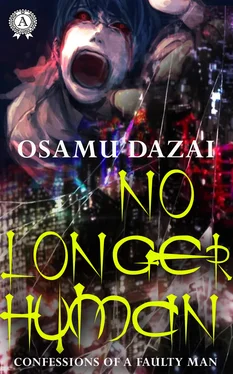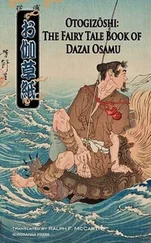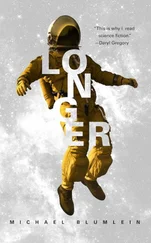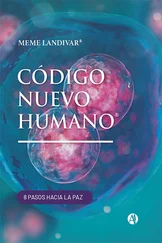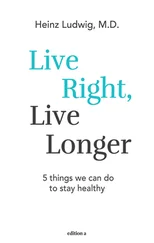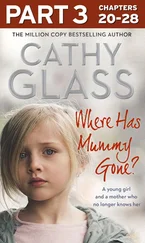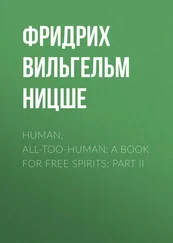Osamu Dazai
NO LONGER HUMAN
Confessions of a Faulty Man
There are three photos of him. He is ten years old in one of them. A boy, wearing a striped hakama [1] Hakama – a bottom part of a man's traditional costume which looks like a pleated skirt.
made from coarse material, is depicted in a garden next to a pond, surrounded by numerous sisters (perhaps, his siblings and cousins). He is bowing his head hard on the left and making an ugly smile. I used the word “ugly” just now, but there are people who cannot tell the difference between ugliness and beauty, and they would probably say, after looking at the picture, “What a nice boy!” And it is not because they want to be kind: there was something in his smile that could be usually characterised as nice. On the contrary, people who know at least something about beauty would grumble, “What an unpleasant child” and probably throw away the picture as if they were holding a worm.
Indeed, the longer you look at this smiling boy the more unpleasant it feels. It is not even a smile. The boy is not smiling at all. Let's look more closely. His fists are clenched. A smiling person does not clench his fists. A monkey. It is a monkey's face with a grimaced smile. Disgusting wrinkles are making an illusion of a smile. You want to call him “a child with wrinkles”. The picture makes a strange impression that there is something very obscene in this boy, something that makes you feel sick. Never in my life have I seen a child with such a weird face.
The second picture impresses as well. Is it possible to change so much? He is a student here, probably a high-school student. You cannot be certain, but it is evident that he looks nicer. However, no matter how strange it may sound, he looks as if he is not alive at this picture. He is wearing a student (or high-school) uniform, a white handkerchief is showing from a pocket on his chest. He is sitting in a wattled arm-chair with his legs crossed, smiling. Only this time, it is not a monkey's grimace, I would say that his smile is exquisite. Still, it is different from a usual smile. You can't feel any sanguinity, the young man does not have taste for life and there is no sense of reality. However you can feel that his smile is as light as not even a bird, but as a feather, a piece of paper. He is kind of artificial. A great character? It doesn't seem so. He is not a hypocrite. Not a soft creature. And, of course, he is not a fopling. Something unpleasant, something from a werewolf or a ghost, can be seen in his face if you look closely. I have never seen any young man with such a weird but beautiful face.
Finally, the third picture is the most fascinating. It is completely impossible to tell his age. His head is grey. He is sitting in a corner of a dirty room (wallpaper, torn in three places is noticeable in the picture) and warming his hands over a small hibachi [2] Hibachi – a hearth dropped into the floor; a traditional heating device in a Japanese house.
. He is not smiling any more in this picture. There is no expression on his face. It seems that the young man, who is warming his hands over a hearth, is slowly dying away. Something ominous, calamity-like breezes from this picture. But there is also something mysterious that impressed me. It was a close-up picture of his face so I could study it in detail-a very usual forehead, nothing stunning about the wrinkles, eyebrows, eyes, a common nose, a mouth, a chin. That's where it is, this face is not only lifeless but also not noticeable, it does not leave any imprint in memory. Just now I glanced at the picture, I close my eyes-and I can't remember anything. I recollect the walls, the hearth, but I can't see the man within these walls. It is impossible to make a portrait or cartoon of such a face. I open my eyes, look again-no, there is nothing in my head, I can't remember the face. It makes you feel very uncomfortable, you become irritated and want to withdraw your eyes.
It was either a seal of death or something else, which replaced his facial expression and hung over the impression it made (imagine a saddled horse's muzzle fixed to a human body). Anyway, there was something in this man that made everyone, who was looking at his picture, startle unintentionally, it was disgusting.
Generally, my whole life consisted of embarrassment. I have never managed to understand what human life is. I was born in a village in the north-east of the country. I saw a train for the first time in my life when I was an adult. I considered railway overpasses to be an amusement built in a foreign style at some ingenious whim; although I used them a lot of times I still couldn't get used to the idea that their purpose was just for a safe crossing over the railway tracks. On more than one occasion, when I was going up or down the overpass, I felt as if I was on a fancy amusement. I considered it to be the most pleasant service delivered by the railway and when later I realised that the overpass was just a bridge over tracks, in other words, a construction of very practical use, I stopped being interested in them.
I remember once when I was a child, I saw a metro in a book, and also for a long time I considered it to be not a transport created for practical use, but an exciting amusement. How fabulous is that to have a ride on a train underground!
I used to be a sickly child. While being, ill I would examine in bed a sheet, a pillow-case, and a duvet cover and would think about their dull design. I only realised the practical side of such things when I was about twenty, and it shocked me, I was afflicted by human mere prudence.
I had no idea about starvation. It was not because I grew up in a family with no needs. I mean something completely different-I have never known a feeling of hunger. Strangely I paid no attention to food, even if there had not been a single crumb in my mouth for a long time. I remember when I was at school-primary and then secondary-I came home and everyone was running around me saying “You must be hungry! Oh, we remember how much we wanted to eat after coming back from school. Would you like sweet natto? [3] Natto – food made from fermented soybeans.
Or maybe a biscuit? There is some bread.” Being a toady from when I was born, I babbled that I was hungry and automatically threw a dozen beans into my mouth, not feeling hungry at all.
I usually eat quite a lot, but I don't remember eating because I am hungry. I ate what I considered to be rare, or delicacies of the table. When I am entertained, I eat more than I need. But from childhood, it's been a heavy duty for me to have meals at home with my family.
Memories about meals in our country house break me into a sweat. Here's how it looked: there were two rows of low tray tables and all of us (our family consisted of ten people) were sitting in front of each other at our tables, and being the youngest one, I was at the last one. The room was gloomy and everyone was eating without saying a word. On top of everything, old rules were followed in our house so the food was always the same and nobody dreamed about any treats or posh food. Thus it's clear why home meals horrified me more and more. When I was sitting in a poorly lit room at my table, shivering with cold, and pushing a handful of rice into my mouth, I was thinking why people needed to eat three times per day. Why their faces are so joyless? Maybe a meal is a ceremony for which all members of a family should always gather at the same time three times (!) per day in a dim room, arrange the tables and eat gloomily even if they don't want. I imagined our meals as praying to spirits that lived in our house.
“You will die if you don't eat”, I was told. Although I believed it was just a threat, this phrase made me feel anxious and scared. “A man dies without food, a man works to eat. It is necessary to eat.” I have never heard anything more inaccessible to understand.
Читать дальше
